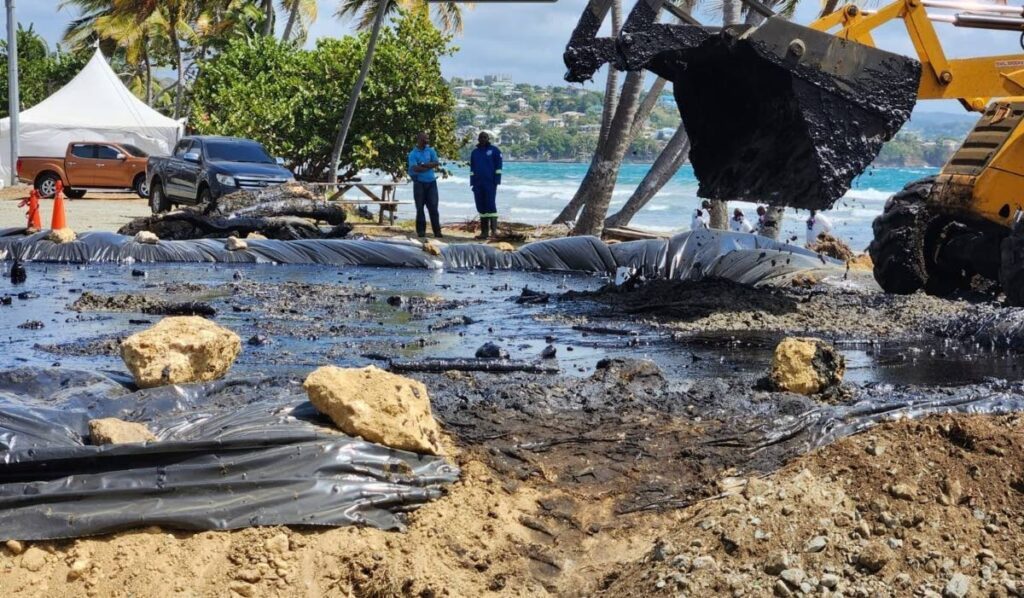Chief Sec, Guyana expert appeal for regional disaster plan

Chief Secretary Farley Augustine and Guyanese-American environmental engineer Dr Vincent Adams have called for improved regional standards in the energy industry to protect the environment. Their appeal follows the oil spill caused by a capsized barge, later identified as the Gulfstream, which was found lodged on a reef near Cove, Tobago on February 7. The barge was being towed by a tug boat, the Solo Creed, which is yet to be found.
Since February 7, an oily substance has been spewing from the vessel and coated the previously pristine shores of Tobago, forcing the closure of a number of beaches, two schools and marine space. It has been a blow to fishermen who look forward to good sales during the Lenten season.
The wind and currents are also carrying the oily substance to other parts of the Caribbean, including neighbouring Grenada.
During an interview with The Bubb Report, a podcast focusing on issues affecting Grenada, on Sunday, Adams described the incident as a wake-up call to the Caribbean.
The 74-year-old Adams, a former senior manager at the United States Department of Energy, said it is important that Caribbean nations work together and plan properly so that oil spills can be tackled expeditiously.
He noted that with Guyana becoming a major oil producer in the world and plans to push its production from 645,000 of barrels of oil per day to over one million, the region should be ready to act in the event of any disaster.
He said the Caribbean is not only at risk for a well blowout or oil spill.
"Every single day there is a ship, probably one every two days; the ship that transports the oil from Guyana to all over the world, they've got to pass through the Caribbean. If one of those ships is carrying one million barrels of oil – this barge is tiny compared to those ships...
"With the frequency, the risk increases. We have to be prepared.
"It's a wakeup call for the Caribbean. It's unfortunate it impacted the beautiful island of Tobago."
Adams said contingency plans are sometimes the difference between life and death.
"I cannot overemphasise the importance of having these emergency plans. We've gotta have it, and especially in countries such as ours. He said frequent exercises to determine readiness and response times are also crucial.
"You cannot wait until an emergency happens...It makes the situation much worse."
In a previous interview, Adams argued that the entire Caribbean should be involved in an environmental impact assessment by energy companies.
Using Guyana as an example, he said if a major spill occurs there, "Based on current flow, it's gonna clear Guyana shores. Trinidad would be wiped completely out, and some other countries all the way to Jamaica."
Adams said he is concerned that it has been confirmed that the Gulfstream was being towed to Guyana but the authorities there have yet to produce a manifest to say what were the contents aboard.
"That manifest has to be sent to Guyana before that ship arrives in Guyana. That manifest has a description, an identification, of the product coming into Guyana.
"The (Guyana) VP (Dr Bharatt Jagdeo) had his press conference on Thursday and he's claiming he doesn't know anything about it. Nobody doesn't seem to know anything about this ship.
"Whoever is the importer...they have to have a licence to bring it in the country....There has to be information at the destination country. If that manifest doesn't exist, there is something fishy going on."
Augustine said the flow of oil from the Gulfstream has slowed, but he is wary that there are more compartments in the vessel filled with cargo.
"We essentially feel as we are getting to the end of this, but in the absence of knowing the schematics of the ship, that is something we are unable to be certain about."
He said the island was fortunate that some of the island's prized tourist sites such as the Buccoo reef, Pigeon Point beach and Store Bay were unaffected,.
However, he said a wildlife rescue and rehabilitation team has been stationed at the Petit Trou lagoon to assist affected animals.
"We set-up almost like a hospital for wildlife, with triage and all kind of thing...
"Those things are costly exercises. If a territory is not adequately prepared for this kind of thing, you can be decimated in the matter of hours."
He agreed with Adams that a regional approach to safeguarding the environment from energy hazards is necessary.
"With Guyana coming on board as a major oil-producing territory, I hope to God as a region we do more to protect our environment. Oil spills are inevitable. I can't say for certain that for the next 100 years we won't get an oil spill again. We have to prepare.
"Territories have to have access to booms, the vacuum tanker trucks, skimmers on hand to extract the fuel-like substance, PPEs on site, frac tanks to store this fuel-like substance. We had to make a mad dash to get the specialised equipment from Trinidad to Tobago."
He said it was fortunate that TT has an energy industry and the inter-island ferry was able to get equipment to Tobago as soon as possible.
"If, per chance, something like this happens off the coast of Grenada St Lucia or Barbados, what is the response? It will be devastating. We have to have regional measures in place."
He insisted that there is a cover-up of the incident happening.
"While the cover-up may not be at Dr Rowley's government, certainly somebody somewhere has sought to have this covered up."
He said with the flow of oil easing, divers have been tasked to try to find an International Maritime Organization number on the Gulfstream, which would help determine who is its owner.


Comments
"Chief Sec, Guyana expert appeal for regional disaster plan"